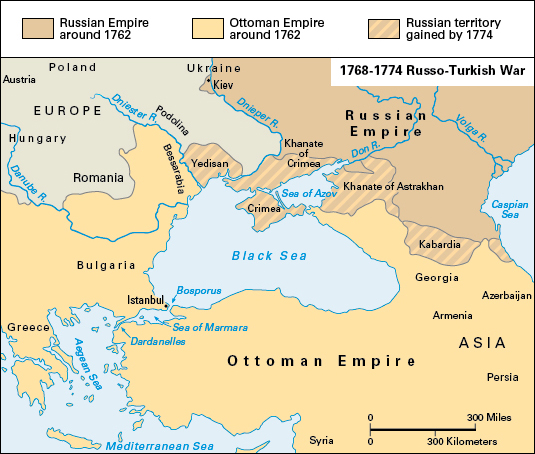Russo-Turkish wars were a series of conflicts between the Russian Empire and the Ottoman Empire, which was based in what is now Turkey. From the 1400’s to the 1900’s, these two empires engaged in nearly constant warfare with each other. At first, they clashed over lands that were claimed by both the Russians and the Crimean Tatars, who were allies of the Ottomans. Most of these lands lie in what is now Ukraine. Beginning in the late 1600’s, Russian advances into Ottoman territory on the Black Sea and in southeastern Europe caused further fighting between the empires.

Peter the Great and then Catherine the Great of Russia each fought successful wars against the Ottomans. During the late 1600’s, Peter forced them out of most of present-day Ukraine. During the 1700’s, Catherine’s armies conquered the Crimea, a peninsula that extends from southern Ukraine, and completed the opening of the southern lands to Russian settlement. Catherine also forced the Ottomans to allow Russian merchant vessels to sail the Black Sea.
Russia and Austria allied themselves against the Ottoman Empire during a war fought from 1736 to 1739. They also formed an alliance against the Ottomans in the two Russo-Turkish wars (1768-1774 and 1787-1792) fought in the reign of Catherine the Great. Russia and the Ottomans were allies briefly in the early 1800’s, but this unusual arrangement did not last.
During the 1800’s, Russia and the Ottomans fought four wars against each other: 1806-1812, 1828-1829, 1853-1856, and 1877-1878. At the end of the first war, Russia acquired Bessarabia (now parts of Moldova and Ukraine). It also gained a special position in the Balkans, a region that included present-day Albania and Bulgaria and much of what became Yugoslavia. The second war gave Russia control of the eastern coast of the Black Sea. The Ottomans won the third war, known as the Crimean War. As a result, Russia lost its dominant position in the Balkans and Black Sea area. However, it regained these losses after the 1877-1878 war.
During World War I (1914-1918), the Ottomans fought on the side of Germany against Russia and the other Allies. Both the Russian and Ottoman empires were destroyed in the war. The nations that succeeded the Ottoman and Russian empires—Turkey and the Soviet Union, respectively—continued to oppose each other. The Soviet Union attempted to seize portions of the Turkish Republic after World War II ended in 1945. But firm Turkish refusal and an alliance between Turkey and the United States blocked the attempt.
See also Berlin, Congress of; Crimea; Crimean War.
